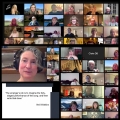Melting People’s Brains at Cheshire Chord Company
 I didn't get a screen-shot but CCC sent me this one:: numbers games in action!On Thursday evening I popped in for a while on Cheshire Chord Company for a session billed as ‘online musicianship games’. As I told them at the start, when people tell you to explain what you do in 10 words, I say, ‘People sing to me and I mess with their heads’. I have a large repertoire of silly things to do that get people feeling like their brains are gently sizzling in butter; the word for this sensation is ‘learning’.
I didn't get a screen-shot but CCC sent me this one:: numbers games in action!On Thursday evening I popped in for a while on Cheshire Chord Company for a session billed as ‘online musicianship games’. As I told them at the start, when people tell you to explain what you do in 10 words, I say, ‘People sing to me and I mess with their heads’. I have a large repertoire of silly things to do that get people feeling like their brains are gently sizzling in butter; the word for this sensation is ‘learning’.
The challenge in planning a session like this is not finding material – I have been borrowing, adapting and inventing this stuff for years – but in crafting it into a longer session. In a regular rehearsal or coaching session I’d use these as ice-breakers, or attention-refreshers: short, intense bursts of brain-stretching silliness as a change from regular skills-based or repertoire-based work.
But you can’t just take what you’d do for 4 mins and do it 7 times in a row to make a half-hour session. That wouldn’t merely melt people’s brains, it would totally scramble them. The trick is to concatenate games up into themed groups so you get a sense of continuity as well as variety, without spending too long on any one exercise. A short breakout session at the 2/3 point also gave structure to the session, and offered the chance for people to interact more directly and more personally. You can see people’s faces better when there are only four of you on-screen!
The final game of the evening was a simple yet very pleasurable improvisation exercise. I stayed on-mic and sang a basic two-bar riff, for everyone else to make up stuff to on mute. I had trialled this with my music team but not yet used it in a rehearsal or coaching context before, and I wasn’t sure what kind of stretch of musical time to expect from it. Would the repeated riff get dull quickly, or would the exercise sustain itself for a while? And how would I know?
To take the last question first: you can tell when people are in a groove by looking at them while they sing, no worries there. And I found as we went on that while I had the responsibility to stay with the riff to provide structure for everyone else, I had scope to play with it too: small rhythmic or melodic variants and dynamic shaping allowed me to create short-to-medium term narratives within the larger flow, keeping myself engaged and giving everyone else new things to play off once they had found their feet with the basic material.
I emerged with three observations from the experience. The first is that this is one of those exercises that, weirdly, works better on Zoom than live. You can’t have 50 singers all independently improvising melody to the same riff in the same room and expect any of them to have a coherent musical experience, but the Zoom set-up means that you can have 50 parallel duets going on simultaneously. Each improviser has a direct and musically-meaningful relationship with the person singing the riff, and this common connection gives it a real sense of being a shared experience. At the same time, each improviser has complete independence to do as they wish.
The second observation follows from this: the combination of musical connection and sonic privacy offered a freedom to the singers they might rarely otherwise experience. The cliché for living unselfconsciously is, ‘Sing as if nobody’s listening’: well, here, nobody was listening. But it was still a very social experience. Mistakes and mishaps were irrelevant – all that was perceptible was each other’s joy in musicking.
The third thought was that part of what set us up to enjoy this so much was the cognitive intensity of the previous games. My first piano teacher taught me a stretching exercise with the purpose of rendering your hands and forearms incapable of tensing up. If I was trying to over-control my playing, she’d have me do it a couple of times so that I’d just have to trust my hands to get on with things without extraneous muscular effort.
The brain-melting pitch and rhythm games on which we spent much of our time had a similar effect on our heads. Twenty minutes of mental agility in different musical dimensions uses up a lot of your executive function and leaves you much less inclined (or indeed capable) to overthink your musical choices when you finally get the chance to relax into a groove.
...found this helpful?
I provide this content free of charge, because I like to be helpful. If you have found it useful, you may wish to make a donation to the causes I support to say thank you.
Archive by date
- 2024 (19 posts)
- 2023 (51 posts)
- 2022 (51 posts)
- 2021 (58 posts)
- 2020 (80 posts)
- 2019 (63 posts)
- 2018 (76 posts)
- 2017 (84 posts)
- 2016 (85 posts)
- 2015 (88 posts)
- 2014 (92 posts)
- 2013 (97 posts)
- 2012 (127 posts)
- 2011 (120 posts)
- 2010 (117 posts)
- 2009 (154 posts)
- 2008 (10 posts)











